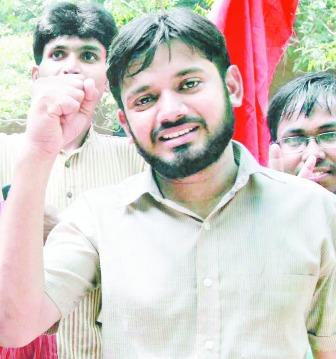New Delhi : The Supreme Court has invoked its inherent powers to directly hear a plea for bail, saying it would take up JNU student union president Kanhaiya Kumar’s petition tomorrow.
The bench of Justices J. Chelameshwar and A.M. Sapre brushed aside objections to bypassing the multiple layers of lower courts as it agreed that a citizen could approach the top court directly if he felt his fundamental rights were being violated.
The court also agreed with two senior lawyers who said “extraordinary situations require extraordinary remedy”.
“If a citizen comes to the court saying my fundamental right is violated we will have to hear it. We may or may not agree with him. We have been saying this earlier. Going by the newspaper reports, something extraordinary is going on in the country,” Justice Chelameshwar, who headed the bench, observed.
Article 32 gives citizens the right to move the apex court directly if they feel their fundamental rights have been violated.
But bail provisions can be invoked only under CrPC Section 436 and a plea has to be first heard by a magistrate or a sessions court, then the high court concerned and, only after that, the Supreme Court.
The apex court decided to hear Kanhaiya’s bail plea directly, agreeing with senior lawyers Soli Sorabjee and Raju Ramachandran, who appeared for Kanhaiya, that “extraordinary situations require extraordinary remedy”.
Kanhaiya, charged with sedition, was brutally assaulted yesterday at the Patiala House Courts complex while being taken to metropolitan magistrate Lovleen’s chamber. The magistrate later remanded the student leader in judicial custody for 14 days.
The assault – after Monday’s attack by a group of lawyers on teachers, students and journalists in the same court complex – took place despite a directive from the top court to ensure full security.
The police did nothing for several minutes as Kanhaiya was punched and kicked all over his body.
In his plea filed through JNU professor Himanshu, Kanhaiya said the “immediate” reason behind his petition was the “surcharged atmosphere of violence at the Patiala House Courts” and the “physical violence and intimidation” he and a large number of students, teachers and journalists had faced.
The petition said the “physical harassment” was in clear violation of a person’s fundamental right to access the justice system. “This petition, therefore, raises issues regarding the violation of rights under Article 21 (right to life and liberty),” it said.
Kanhaiya, who said he had been falsely implicated, also voiced fears that he might be attacked in prison by fellow inmates. “The situation of dire threat to the life of the petitioner still prevails and further incarceration… in these circumstances is a constant threat to his life. The petitioner perceives a threat to his life in prison where there is a great likelihood of an attack on him by his co-prisoners,” the plea said.
It said no other remedy “virtually remains” and, therefore, the petitioner “craves leave to directly approach the Hon’ble Supreme Court of India for a writ under Art. 32 of the Constitution of India”.
Former additional solicitor-general Harin Raval said the Supreme Court could directly hear a bail plea in extraordinary cases. Raval was part of the panel of six senior advocates the apex court had sent on a fact-finding mission to the Patiala House complex.
The bench brushed aside the objections of an advocate, R.P. Luthra, who had intervened but is not connected to the case.
Luthra, whose locus standi was questioned by Ramachandran, said many of the advocates who had queued up for Kanhaiya had remained silent spectators when Delhi High Court was shut for 15 days last year because of a lawyers’ strike.
“It was an alarming situation at that time but none of these lawyers had come to this court at that time,” he said.
“Let us not make general statements,” Justice Chelameshwar said, adding: “What is alarming or not is for the court to examine.”
The court then said it would take up Kanhaiya’s bail plea at 10.30 tomorrow morning.
The bench said it would take up a petition filed by Subhash Chandran, an apex court advocate, bringing to the court’s notice the atmosphere in the Patiala House complex.


